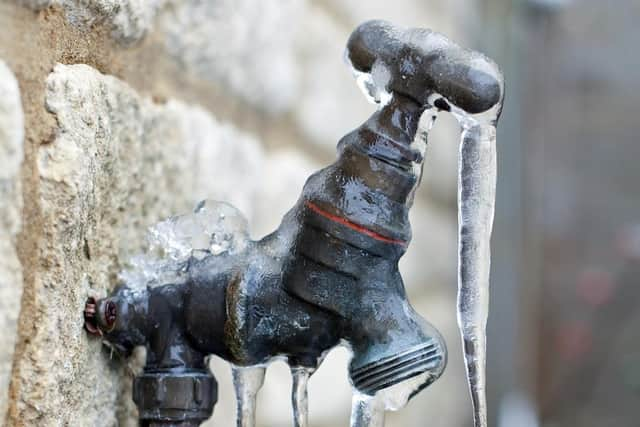What to do if you have a frozen or burst pipe and how can you prevent it? Yorkshire Water and Met Office explain
Yorkshire Water issued a warning on Wednesday (January 5) that household pipes could potentially freeze during the cold weather this week.
The water company advised customers to take measures to prevent frozen pipes - but what should you do if a household pipe freezes or bursts?
What to do if you have a frozen or burst pipe?


Advertisement
Hide AdAdvertisement
Hide AdYorkshire Water advised residents to turn the water off at the stop tap and defrost the pipe with a hairdryer.
The company warned people never to use a naked flame to defrost the pipe.
When it comes to frozen pipes, the Met Office has recommended thawing out pipes slowly by using a hairdryer at its lowest setting, hot water bottles, or towels soaked in warm water.
The Met Office said: “Do not use direct heat as this may cause permanent damage to the pipes and could also lead to a fire in the home.
Advertisement
Hide AdAdvertisement
Hide Ad“Turn on nearby cold taps (keep the stop tap turned off) this will relieve pressure on the frozen pipe.”
If a pipe bursts, the weather service advised residents to turn off the mains water supply immediately by using the stop tap; this will stop any more water getting into the water pipes.
If the burst pipe is on the main water system, the rush of water will stop after a brief amount of time.
However, if the rush of water does not stop or there continues to be a constant run of water, the problem is probably due to the cold water storage system.
Advertisement
Hide AdAdvertisement
Hide AdIn this case, you will need to drain down the cold water storage tank which is normally located in the roof space.
“Most importantly, if the worst happens, keep calm, do not panic and if you suspect you have frozen pipes contact your nearest WaterSafe plumber from the UK national accreditation scheme,” the Met Office added.
How to prevent a burst or frozen pipe
According to Yorkshire Water, prevention is pretty simple. You protect pipes from freezing the same way you protect your body from freezing: by keeping them wrapped up.
Sub-zero temperatures can cause water pipes to freeze and burst - and if this happens, it will cut off your water supply. So it is vital to give your home a warm ‘hug’ this winter by lagging your pipes.
1. Protect your pipes and taps
Advertisement
Hide AdAdvertisement
Hide AdYou must check for pipes, taps, cisterns, tanks and water meters in unheated areas that might be exposed to the cold.
When you’ve located them, cut a piece of lagging (heat insulation material) to size and clip it on. If you have got some cable ties handy, wrap them on the pipe to keep it secure. Protect your outdoor taps with a tap cover to stop them freezing.
2. Keep it cosy
Heating your home is an expensive task, but so is a burst pipe. If you can, leave your heating on constantly at a low temperature so that your pipes don’t freeze.
If the weather is predicted to be severe, set the heating to your usual level, day and night.